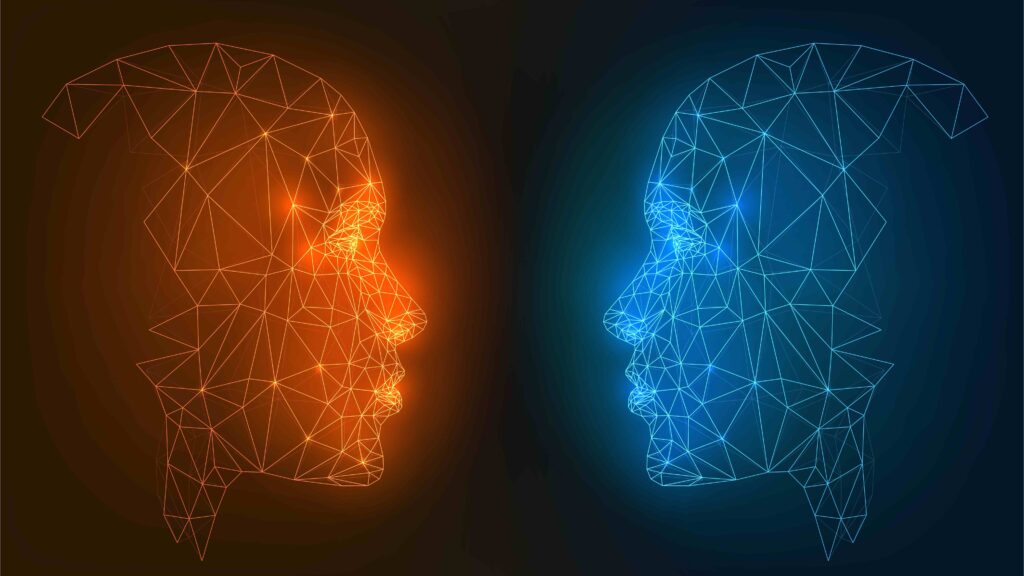
“I’m spiritual but not religious.” If this describes your experience, you are among the nearly 30% of US citizens who hold spiritual beliefs but do not practice a mainstream religion. The origins of most esoteric or non-religious beliefs lie within a paradigm called non-dual thinking. A sizable body of literature on the subject of non-dual thinking has found a place in the West as spiritual seekers increasingly explore its roots through traditions such as Zen Buddhism, Hinduism, and Christian mysticism.
Individuals who resonate with non-religious spirituality are more likely to either reject a God concept or embrace a more boundless, omnipresent version of God than what mainstream religion defines. This discussion about the relationship between religion, spirituality, and non-duality may shed some light on your particular place on the spiritual spectrum, not to mention lend some spirited banter to your next dinner party.
Relating Organized Religion to Duality
Duality is the paradigm through which most followers of religion view the world. Dual thought forms provide a useful structure, a way to categorize experiences and beliefs into opposing and distinct characteristics. Familiar examples of duality include:
- Good and evil
- Fortune and poverty
- Love and hate
- You and me
- God and worshippers
In daily life, duality plays out vividly when you are rejected for a job, cut off in traffic, or injured. Most people perceive these experiences as bad outcomes that should be feared and avoided. Non-dual thinking, on the other hand, asks how you know these are bad outcomes. The notion that one experience is bad and the other is good–that human discomfort dictates the spiritual relevance of an experience–may itself be the root cause of human discontent. The mystical underpinnings of all religious and spiritual traditions view dual thinking as a delusion of separateness, a way of “pushing the river” that actually causes the very suffering believers may seek to avoid.
Understanding Oneness With God
The God of most mainstream religions is praised and seen as the all-knowing, all-powerful creator of the universe. Spiritual thinkers view God not as a supreme creator force that preceded the universe. They see God as synonymous with it.
Author and spiritual teacher Deepak Chopra offers a parable wherein he described to a group of students the concept of Christ-consciousness as a divine quality that dwells in us all. An attendee asked if he was denying Christ’s ultimate divinity. Chopra explained that no, he was not denying Christ’s divinity, just as he was not denying the divinity of the questioner or of every other person in the room. Non-duality rests in a oneness among all beings. God did not create the universe. God is the universe. You are God, and God is you.
Demystifying Non-Dual Thinking
Non-duality is a relatively simple concept, but when overlaid with Western conditioning, it feels like a foreign language. Writing about non-duality is a bit like dancing about accounting; the vehicle is inadequate to communicate the essence of the subject matter. Though language can offer the mind a starting place, direct experience is the way to comprehend the nature of non-dual thinking.
Non-duality honors all forms of spiritual or religious teachings and sees them as tools meant to redirect followers back to the essence of their own experience. Honoring the perfection in every single moment is the vehicle through which spiritual thinkers experience God, serenity and oneness. Cultivating consistent moment-to-moment awareness reveals that neither salvation nor enlightenment requires adherence to moral principles or guidance by a godhead; they are already present within every individual.
Humans value the expansive feelings associated with spiritual belonging, commonness of purpose and the promise of everlasting life. Religious doctrine teaches that following a set of tenets and speaking to God through prayer are the righteous path. Spiritual traditions embrace a more boundless, experiential orientation—a belief that the fundamental nature of humanity is experience itself. Accepting that is the key to finding freedom amid every circumstance life presents.

